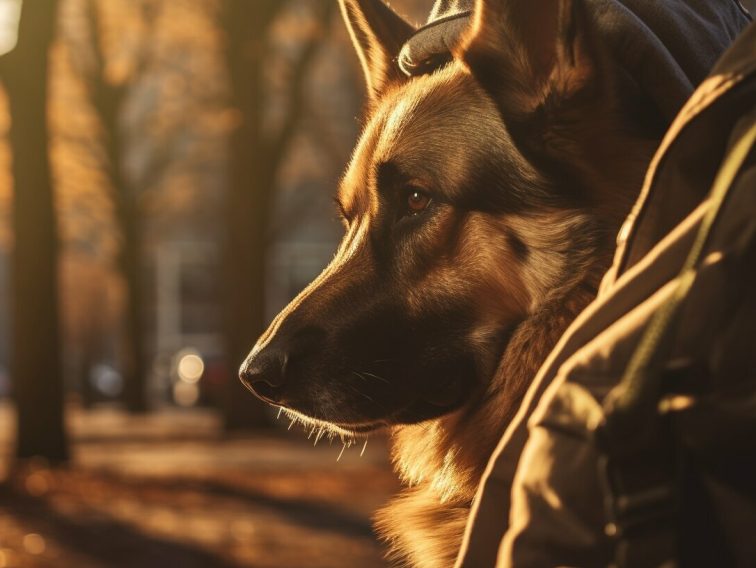German Shepherds are a popular breed known for their loyalty and intelligence. However, just like any other breed, they are susceptible to anxiety. German Shepherd anxiety is a condition that affects many members of this breed, causing them to exhibit a range of symptoms that can affect their quality of life. In this article, we will delve into the causes of German Shepherd anxiety and provide tips on how to manage it.
German Shepherds may be predisposed to anxiety due to genetics, but environmental factors such as lack of socialization and traumatic experiences can also play a role. As pet owners, it’s important to recognize the signs of anxiety in German Shepherds so that we can take appropriate action.
Signs and Symptoms of German Shepherd Anxiety
German Shepherds are known for their intelligence, loyalty, and courage. However, they can also be prone to anxiety, which can manifest in various ways. Here are some common signs and symptoms of anxiety in German Shepherds:
| Behavior | Description |
|---|---|
| Excessive barking | An anxious German Shepherd may bark excessively, especially when left alone. |
| Whining | Whining is another common sign of anxiety in German Shepherds, as they may try to vocalize their distress. |
| Destructive behavior | If your German Shepherd is anxious, you may notice that they start chewing or digging on furniture, doors, or walls. |
| Aggression | Some German Shepherds may become aggressive when anxious, either towards people or other pets. |
| Trembling | An anxious German Shepherd may shake or tremble, especially during stressful situations. |
| Pacing and restlessness | Your German Shepherd may pace back and forth or seem restless, unable to settle down. |
In some cases, anxious German Shepherds may also develop physical symptoms like diarrhea, vomiting, or loss of appetite. It’s important to be aware of these signs and take action to help your pet feel calmer and more secure.
What to Look For
Every German Shepherd is unique, and not all dogs will display the same signs of anxiety. However, by paying attention to your pet’s behavior and noting any changes or unusual reactions, you can recognize when they may be struggling with anxiety.
Creating a Calming Environment for German Shepherds
German Shepherds with anxiety require a stable and calming environment at home to alleviate their symptoms. Creating a peaceful atmosphere can help your furry friend feel safe, secure, and better able to manage their anxiety.
Here are some tips for creating a calm environment for your German Shepherd:
| Tip | Description |
|---|---|
| Use Pheromone Diffusers | Consider using pheromone diffusers to release calming scents throughout your home. These are scentless to humans but can mimic the pheromones that nursing dogs release, helping to create a sense of relaxation and security for your German Shepherd. |
| Provide Cozy Bedding | It is essential to provide your German Shepherd with a comfortable, cozy, and quiet bed in a designated area of the home. This will enable them to retreat to their peaceful space when they feel overwhelmed or anxious. |
| Minimize Noise | Avoid creating any loud or sudden noises that may trigger your German Shepherd, such as slamming doors or clanging pots and pans. Try to keep the environment as peaceful and quiet as possible. |
| Create a Predictable Routine | Establishing a structured routine can help your German Shepherd feel safe and secure in their environment. Provide a consistent schedule for feeding, exercise, and playtime to help them know what to expect each day. |
You can also consider creating a designated cozy corner in your home where your German Shepherd can retreat when feeling overwhelmed. Or look into compression clothing for pets. Place a comfortable bed, some favorite toys, and a few familiar items nearby to make them feel more secure.
By following these suggestions, you can create a calming and reassuring environment for your German Shepherd, which can help to decrease their anxiety and improve their quality of life. Also, try GABA (After consulting with your Vet). A lot of pets are given GABA and it helps tremendously. It may even help if you yourself have some left arm pain due to anxiety.
Behavioral Techniques to Reduce German Shepherd Anxiety
If your German Shepherd is suffering from anxiety, there are several behavioral techniques that can help alleviate their symptoms and promote relaxation and calmness.
Positive Reinforcement Training
Positive reinforcement training is one of the most effective techniques for reducing anxiety in dogs, including German Shepherds. This training method involves rewarding good behavior with treats, praise, or toys, rather than punishing bad behavior. This helps build trust, confidence, and a positive association with their surroundings.
For example, if your German Shepherd becomes anxious during car rides, start by rewarding them for getting into the car without displaying signs of anxiety. Slowly increase the length of the car ride while rewarding them for remaining calm throughout the journey. This will help your pet associate positive experiences with the car, reducing their anxiety over time.
Enrichment Activities
Engaging your German Shepherd in enrichment activities can help redirect their focus and reduce anxiety. These can include activities that stimulate their senses and challenge their minds, such as puzzle toys, scent games, and obedience training.
For example, scatter treats or toys around the house or yard and encourage your German Shepherd to find them. This will stimulate their senses and provide mental stimulation, reducing their anxiety by keeping them occupied and engaged.
Interactive Toys
Interactive toys, such as treat-dispensing balls and puzzles, can provide mental stimulation and reduce anxiety by redirecting your German Shepherd’s attention from their anxious behaviors.
For example, give your German Shepherd a treat-dispensing ball filled with their favorite treats or kibble. They will enjoy the challenge of trying to extract the treats and will remain occupied for longer periods, reducing their anxiety.
Mental Stimulation Exercises
Providing mental stimulation exercises for your German Shepherd can help improve their cognitive function and reduce anxiety. These exercises can include obedience training, agility training, and other interactive games that challenge their minds.
For example, engaging your German Shepherd in agility training can help build their confidence and reduce anxiety. Start by setting up a simple obstacle course and encouraging them to navigate it. As they progress, add more complex obstacles to challenge their skills and build their confidence.
Seeking Professional Help for German Shepherd Anxiety
While managing anxiety in German Shepherds can be a challenging task, some cases may require the intervention of a professional. If you notice that your German Shepherd’s anxiety is not improving or is getting worse despite your efforts, seeking the help of a veterinarian, animal behaviorist, or professional dog trainer is recommended.
Your first step should be to visit your veterinarian, who can rule out any underlying health conditions that may be contributing to your dog’s anxiety. They can also prescribe medication or suggest dietary changes to aid in managing your dog’s anxiety.
If medication alone is not enough, it may be necessary to consult an animal behaviorist or professional dog trainer. These experts can help you develop a comprehensive behavior modification plan tailored to your German Shepherd’s specific needs and personality. Positive reinforcement training and desensitization techniques can be effective in reducing anxiety in dogs.
When choosing a professional, be sure to research their credentials, experience, and reputation carefully. Look for someone who has experience working with German Shepherds and treating anxiety-related behavior issues. Don’t hesitate to ask for references or testimonials from previous clients.
There are different treatment options available depending on the severity of the anxiety and the specific needs of your German Shepherd. Some dogs may require ongoing professional support, while others may benefit from a few sessions to learn coping mechanisms and relaxation techniques.
Don’t hesitate to seek professional help if you feel overwhelmed or unsure about how to manage your German Shepherd’s anxiety. With the right treatment plan and proper support, it is possible to reduce anxiety and help your dog lead a happier and more relaxed life.
Tips for Managing German Shepherd Anxiety in Everyday Life
Living with an anxious German Shepherd can be challenging, but there are many ways you can help manage their anxiety in everyday life. Here are some practical tips to help keep your furry friend calm and comfortable.
Exercise and Socialization
Exercise is essential for maintaining your German Shepherd’s physical and mental health. Regular walks, runs, and playtime can help reduce anxiety by releasing pent-up energy and promoting relaxation. Socialization is also crucial, as it can help your German Shepherd feel more secure and confident around new people, animals, and environments.
- Take your German Shepherd for at least two leisurely walks a day, preferably in a quiet and familiar area.
- Engage your German Shepherd in interactive games that encourage physical activity and mental stimulation, like fetch or hide-and-seek.
- Arrange playdates with other well-behaved dogs to help your German Shepherd learn social skills and build confidence.
- Expose your German Shepherd to new environments and experiences gradually and positively, using treats and praise to reward good behavior.
Structured Routine
German Shepherds thrive on routine and predictability. Establishing a consistent schedule can help your anxious German Shepherd feel more secure and less stressed.
- Set a regular feeding schedule and stick to it.
- Create a predictable routine for playtime, exercise, and rest, and try to maintain this schedule as much as possible, even on weekends and holidays.
- Use verbal cues and rewards to establish clear boundaries and expectations.
- Avoid sudden changes to your German Shepherd’s routine, as this can trigger anxiety.
Relaxation Techniques
Just like people, dogs can benefit from relaxation techniques that promote calmness and reduce anxiety.
- Practice deep breathing exercises with your German Shepherd, focusing on long, slow inhales and exhales.
- Use aromatherapy and massage to promote relaxation and reduce stress.
- Try playing calming music or white noise to create a soothing environment.
Keep in mind that managing anxiety in German Shepherds is a long-term process that requires patience, consistency, and lots of love and attention. With the right techniques and support, you can help your furry friend live a happier, healthier life.
FAQ about German Shepherd Anxiety:
As a German Shepherd owner, it is natural to have questions and concerns about your pet’s anxiety. Here are some common questions and informative answers to help you gain a better understanding of this topic:
Can anxiety be cured in German Shepherds?
Anxiety in German Shepherds is a treatable condition, but it cannot be completely cured. With proper treatment and management, you can help reduce your pet’s anxiety and improve their overall quality of life.
How long does it take to see improvement in an anxious German Shepherd?
The amount of time it takes to see improvement in an anxious German Shepherd depends on several factors, such as the severity of their anxiety, the type of treatment being used, and the individual dog’s response to treatment. In some cases, it may take several weeks or even months to see significant improvement.
Can anxiety medication be used to treat German Shepherd anxiety?
Yes, medication can be an effective treatment for German Shepherd anxiety. However, medication should always be used under the guidance of a veterinarian or animal behaviorist, who can help determine the appropriate medication and dosage for your pet’s specific needs.
What is the role of exercise in managing German Shepherd anxiety?
Regular exercise is an important part of managing German Shepherd anxiety. Exercise can help reduce stress, provide mental stimulation, and promote overall physical and mental health. However, it is important to ensure that your German Shepherd is getting enough exercise without overexerting themselves, which can lead to more stress and anxiety.
Can socialization help reduce anxiety in German Shepherds?
Yes, socialization can be an effective way to reduce anxiety in German Shepherds. By exposing your pet to a variety of people, animals, and environments in a controlled and positive manner, you can help build their confidence and reduce their fear of new experiences. However, it is important to approach socialization carefully and gradually, with the guidance of a professional if necessary.



